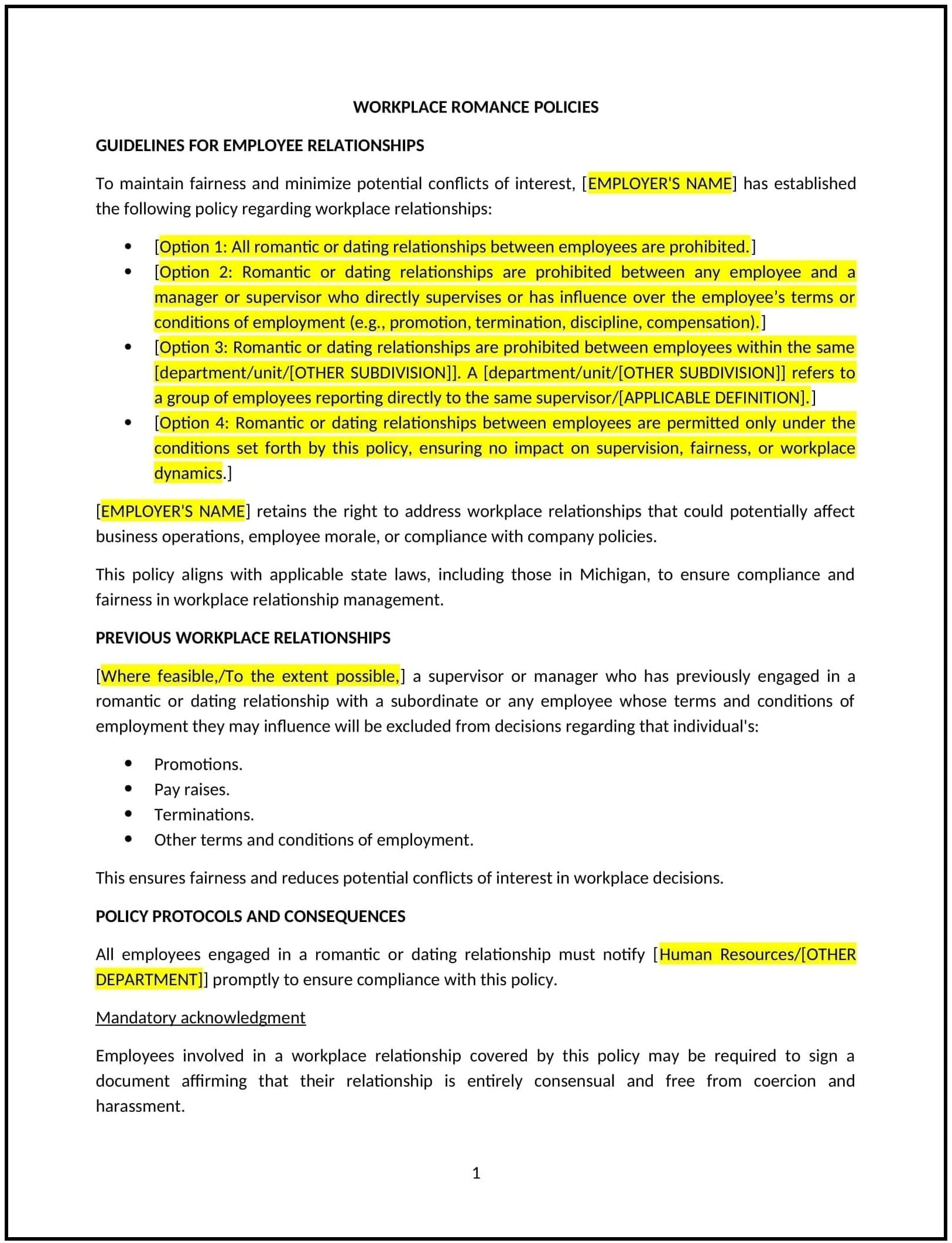Got contracts to review? While you're here for policies, let Cobrief make contract review effortless—start your free review now.

Customize this template for free
Workplace romance policy (Michigan)
A workplace romance policy sets clear guidelines for managing romantic relationships between employees in Michigan businesses. The policy addresses the potential risks of workplace relationships, including conflicts of interest, allegations of favoritism, or sexual harassment, and outlines the company’s expectations for professional behavior in these situations. It provides guidance on disclosure requirements, how to handle potential conflicts, and what actions the business may take to maintain a respectful and professional work environment. The policy also aims to protect both employees and the business by creating a transparent framework for managing workplace romances.
By implementing this policy, businesses can foster a work environment where relationships are handled professionally, minimize potential risks associated with workplace romances, and ensure that employees' personal lives do not interfere with their job performance or the business’s operations.
How to use this workplace romance policy (Michigan)
- Define workplace romance: Clearly outline what constitutes a workplace romance, including relationships between employees, supervisors, or subordinates. Specify any exceptions, such as relationships that do not create conflicts of interest or workplace disruptions.
- Establish disclosure requirements: The policy should require employees to disclose any romantic relationships with colleagues, particularly if one of the individuals is in a position of authority over the other. The disclosure helps mitigate the risk of perceived favoritism or conflicts of interest.
- Set expectations for professional behavior: Emphasize that all employees, regardless of their relationship status, are expected to maintain a professional demeanor and avoid behavior that could disrupt the workplace, such as public displays of affection or inappropriate communication.
- Address conflicts of interest: Clearly define what constitutes a conflict of interest and explain the steps the business will take to address potential conflicts. This could include reassigning roles or adjusting reporting structures to eliminate any direct supervisory authority over a romantic partner.
- Outline consequences for violating the policy: Specify the consequences of violating the workplace romance policy, such as disciplinary actions or termination if relationships create significant workplace issues or conflicts of interest.
- Provide guidance for reporting harassment: The policy should encourage employees to report any concerns about harassment or inappropriate behavior related to workplace romances, including how to report issues confidentially.
- Respect privacy: While the business may require disclosure of workplace romances, it should also respect employees’ privacy regarding personal relationships outside of work. The policy should clarify that the business will not interfere with employees’ personal lives as long as it does not impact the workplace.
- Review and update regularly: Periodically review and update the policy to ensure it reflects changes in business practices, legal requirements, and employee needs, particularly as workplace dynamics and attitudes toward relationships evolve.
Benefits of using this workplace romance policy (Michigan)
This policy provides several key benefits for Michigan businesses:
- Reduces the risk of conflicts of interest: By requiring disclosure and setting clear guidelines, businesses can reduce the risk of conflicts of interest that might arise from romantic relationships between employees, particularly those involving supervisors and subordinates.
- Mitigates potential legal risks: A clear and consistent policy helps businesses avoid legal issues related to sexual harassment, discrimination, or favoritism, which could arise from unaddressed workplace romances.
- Maintains a professional work environment: Setting clear expectations for behavior ensures that employees can maintain a professional demeanor, even when dealing with personal relationships, which helps preserve a respectful and productive work environment.
- Promotes fairness and transparency: The policy ensures that all employees are treated fairly, and that romantic relationships do not impact decisions regarding promotions, assignments, or other workplace matters.
- Protects employees from harassment: By providing clear guidelines for reporting harassment, the policy helps create a safe and supportive workplace where employees are protected from unwanted behavior.
- Enhances business reputation: Having a clear and comprehensive workplace romance policy demonstrates the business’s commitment to professionalism and fairness, which can enhance its reputation with employees, customers, and stakeholders.
Tips for using this workplace romance policy (Michigan)
- Communicate the policy clearly: Ensure that all employees are aware of the workplace romance policy by including it in the employee handbook, during onboarding, and in regular communications about workplace conduct and expectations.
- Provide training: Offer training sessions to employees and managers about the policy, emphasizing the importance of maintaining professional relationships and addressing potential conflicts of interest.
- Handle disclosures with sensitivity: Treat disclosures of workplace romances with respect and confidentiality. Ensure that any necessary accommodations or actions are taken discreetly to protect employees’ privacy.
- Monitor the workplace environment: Regularly assess the workplace for signs of conflicts of interest or inappropriate behavior related to workplace romances. Address any issues promptly to prevent disruptions.
- Foster a culture of respect: Encourage a workplace culture where employees feel comfortable discussing concerns and where respect, professionalism, and mutual consent are prioritized in all workplace relationships.
- Review and update the policy regularly: Periodically review the policy to ensure it aligns with evolving legal standards, business practices, and employee expectations. Consider seeking legal advice if significant changes to the policy are needed.